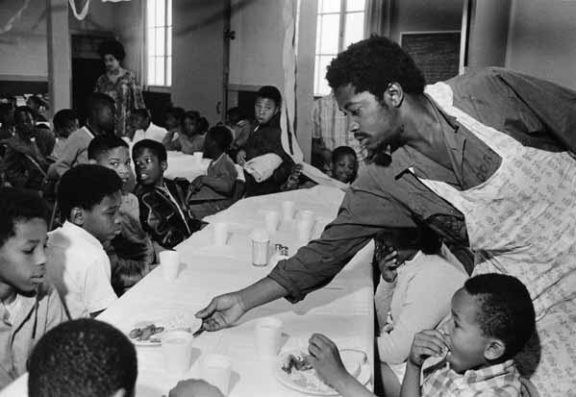- Photo by (July to October 1968)
- Free Breakfast for Children Program. Started in late 1968, the Panthers cooked and served full breakfasts to school-aged children at St. Augustine’s Episcopal Church in Oakland.
- San Francisco photographers, Ruth-Marion Baruch and Pirkle Jones, who photographed the Oakland-based Black Panther Party intensively from Rejecting the portrayal of the Black Panthers in the mainstream press as criminals and subversives, Baruch and Jones spent several months capturing their own impressions of the Panthers. The result is a series of photographs that depict the dignity and humanity that animated the young revolutionaries, as well as more universal themes of family, commitment, and hope for the future.
- The idea to photograph the Panthers was originally Baruch’s. She proposed her idea of an exhibition expressing “the feeling of the people” to Jack McGregor, then director of the de Young Museum in San Francisco. In early summer 1968 Baruch met with Kathleen Cleaver, the Communications Secretary of the Black Panther Party, and made arrangements for Baruch to meet Eldridge Cleaver, the party’s Minister of Information. Eldridge Cleaver invited Baruch to take pictures at a Free Huey rally at DeFremery Park in Oakland. Jones accompanied Baruch to the rally, and the two collaborated on the project over the next several months.
- On December 7, 1968, A Photographic Essay on the Black Panthers opened at the de Young Museum to record crowds. The show traveled to the Studio Museum in Harlem; Dartmouth College in Hanover, New Hampshire; and UC Santa Cruz.
- Panthers’ breakfast offering came at a pivotal time for America: 1968 was a turning point in the civil rights movement. Martin Luther King, Jr. and Robert F. Kennedy were both gunned down. There was a changing of the guard of sorts, from nonviolent protest for equality to the long, hot summer of riots in black communities all over the country.
- In Oakland, the Black Panthers brought a new message of self-determination. The message caught on and their programs quickly spread to black communities across the country, tired of waiting to be saved or treated with equity.
- By the end of 1969, the Black Panthers were serving full free breakfasts (including milk, bacon, eggs, grits, and toast) to 20,000 school aged children in 19 cities around the country, and in 23 local affiliates every school day
- “From coast to coast feeding the community has always been a part of being a Panther,” said Billy X Jennings, a former Panther and member of It’s About Time, the Black Panther Legacy and Alumni Project.
- While the causes that led to the creation of the Black Panther Party were myriad, Jennings explained that they were most pronounced “where concentrated Black communities living under the poverty level were going unassisted by the government.”
- “You had a situation in Oakland particularly where young kids would fall over and faint from hunger,” said Jennings. “The school’s solution was to send the kids home to eat. But that didn’t really follow logic. If there was food at home, then kids wouldn’t be fainting.”
- Forbes says that they were an easy target, “because the public wanted to believe that we were just thugs with leather jackets and guns.”
- J. Edgar Hoover, perpetuated that image when he declared all out war on the Black Panthers. In May of 1969 Hoover sent a memo to all FBI offices that read:
- “The BCP (Breakfast for Children Program) promotes at least tacit support for the Black Panther Party among naive individuals and, what is more distressing, it provides the BPP with a ready audience composed of highly impressionable youths. Consequently, the BCP represents the best and most influential activity going for the BPP and, as such, is potentially the greatest threat to efforts by authorities to neutralize the BPP and destroy what it stands for.”
As depicted in the 2015 documentary The Black Panthers: Vanguard of the Revolution, it was Huey P. Newton, upon release from jail in 1970, who revitalized the breakfast program as a key social focus for the Panthers in Oakland; from exile in Algeria, Eldridge Cleaver protested that prioritizing the breakfast program diluted the true mission of the Black Panther Party, which Cleaver emphasized had to remain an “any means necessary” political opposition to U.S. government practices, thus concretizing a schism in the leadership of the Black Panther Party – into Cleaver vs. Newton factions – that led to its eventual demise.
